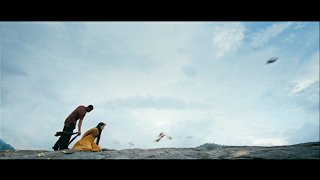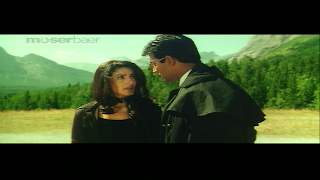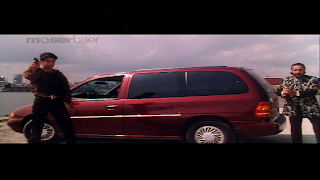






I think the year 2013 was never anticipated to be as special for Indian movies as it ended up being. I was certainly surprised, after 2012's batch of both good and bad films, for 2013 to be filled with such incredible and incredibly bizarre films! So it's good to recap, isn't it?
First off, I know I am not backed by many people on this, but I think the DDLJ sequel Dilwale Dulhania Phir Le Jayenge was actually one of the most brave, unconventional films of recent years. This is no RGV ka Aag, but nearly as classic as the original. Aditya Chopra's idea to have Raj and Simran (same names, nothing to do with the original characters) to be stuck together at the US border for days on end was a fascinating portrayal of the NRI community dealing with racism in the US. Kajol's performance as the tough-as-nails FBI agent just doing her job was absolutely something to witness, and her interactions with Raj, the journalist suspected of being a terrorist under a fake identity, painted a very complex picture of what it means to be a person of Indian descent in today's North America. The guest appearance by the famous cowbell was a special touch, but what really gets to you is the post-interval plot - where Raj discovers Simran's arranged marriage to a Hindu nationalist, set up by her US politician father, and decides to crash the wedding - for justice. How about that shoot-up on the mustard field? Brilliant.
A lot of people harped on this movie for its mutilation of the classic original, but to me this was the perfect case of something new, something borrowed, and something blue. Shahrukh and Kajol shine in these drastically re-written roles, and Aditya Chopra peels back the harmony of both the NRI experience and his idealistic Punjab imagery for a chance to really talk about something real. The romance takes the backseat, but I was in tears by the end all the same; the ending gave enough promise that these two might find happiness together. For that, DDPLJ is my movie of the year.

What didn't work as well was Dhoom 3. I was all set for a goofy good time and some action scenes, with Aamir as the villain, but some of the turns the story took were just too out there. While I appreciated holographic Guru Dutt for making an appearance, SPOILER - Katrina turning out to be just a clone of Aamir's villain character was a little disturbing to say the least. So what, was he romancing HIMSELF in the sexy picturization of The Thong Geet? Are you kidding me? Of course, some people claim that post-credits we get a clip where it turns out Aamir's clone was actually Salman's character, leading up to the next film in the series, but I won't believe it until I see it on the DVD!
Still, I've heard people praise Aamir's performance in this film, so maybe I just need to rewatch it. Another praised performance was of course Abhay Deol in the much discussed but not that widely seen dialogue-free art film Mere Ankhon / Me, also known as the "Abhay Deol stares at the camera for 4 hours" film. A lot of reviews just asked "why was this film made?" while I have a feeling I'll like it, so I'll ask - why wasn't this film made earlier?
On the Southie side, I hear good things about the Tamil Sridevi-Siddharth "switcharound" film Nee. Maybe it'll start a trend of older heroines with young heroes? I have some serious catching up to do..

My favourite comedy was definitely Akshay Kumar's Tere Liye Kuchh Bhi (I enjoy Akki's brainless comedies every now and then but this film was positively brainful!), but I really appreciated Sriram Raghavan's puzzlingly quickly-made tribute to modern cinema, the absolutely stellar, clever breaking-the-fourth-wall comedy, I Hate Imran Khan Luv Stories, in which Imran Khan meets himself from the future, chewing over his past and future career, its mistakes and how to fix them. Who would have guessed that Sonam Kapoor was so good at playing Imran Khan from the future? Some people thought this film was trying too hard, but I loved it.
Then there were some bad films, like Gooli Gooli Maar (why Abhishek, why?) and Emraan Hashmi's Teeen!!! (yes, three exclamation marks), which had the actor play three generations of characters, much like his character in The Dirty Picture. Whoever thought that was a genuinely good idea? And just when I was beginning to like Emraan! Vidya did great in her films this year, but that much is to be expected. Her and Madhavan teaming up again in Vishal Bhardwaj's short film Skirt about gender discrimination in the urban workplace was not flawless, but a good effort nonetheless.
As you can tell, I've still lots of films to watch, but out of this year's batch I'd recommend all of the films I've discussed - even the bad ones are special for the WTF factor! What did you love and hate in 2013? Is there anything I missed?





 Prithviraj's version of Dev is rather straight-forward, as was Vikram's role in the Hindi version. This is a cop, this is a man on a mission, but there are some differences, too. It seemed to me that there was a certain ambivalence to Vikram's character longer through the movie until the ruthlessness of Dev slowly began to emerge. He was more determined and humorless.
Prithviraj's version of Dev is rather straight-forward, as was Vikram's role in the Hindi version. This is a cop, this is a man on a mission, but there are some differences, too. It seemed to me that there was a certain ambivalence to Vikram's character longer through the movie until the ruthlessness of Dev slowly began to emerge. He was more determined and humorless.






A Facebook site called Tamil Film Updates posted this folder of promotional images for Shankar's "Robo", with the following description:
Years back, Shankar started "Robo" with Kamal Haasan & Preity Zinta to play the roles of Rajjinikanth & Aishwarya in the present Enthiran. But the project didn't take off at that time due to some issues. These are the exclusive pics from the photoshoot.
This was in 1998. I imagine the film would not have been half as epic as special effects, Shankar's greatest love next to a good social message, weren't exactly fully developed in the late 1990s, but I would've enjoyed this pairing, if nothing else, in these roles. In my Enthiran review I didn't give very high marks to anybody in this film for acting, including Rajnikanth. Aishwarya's lack of acting could largely be blamed on the abysmal writing for the character. Regardless, it's an interesting "what might have been"..
I recommend you check out the rest of the album, if nothing else than for the late 90's sci-fi get-ups.
The title for this review comes from the boast written on my VCD's cover - one that was sent to me by Ramsu, who I am indebted to for telling me about this film in the first place and later providing me with a copy.
The boast is about right, for Singeetham Srinivasa Rao's Pushpak (occasionally going by its full title Pushpaka Vimanam) does manage to convey volumes without any dialogue. It's a black comedy with a social conscious, and though it contains a couple of symbolic moments that aren't precisely subtle, it all the same manages to entertain and provoke thought. The title card comes up in Telugu, as do the credits, but as the film is silent, it's essentially without language, relying on background music indicating certain things and gestures to work as primary communication between characters.
The title also has a Hindu mythological meaning, for pushpaka vimanam or "flowery chariot" is the flying chariot that Raavan stole and eventually rode on. Inside the film, there's a titular luxury hotel with the same name - a hotel whose owner used to just run a tea stall, the film seems to imply.
 The nameless unemployed young man (Kamal Hassan) seems rather fed up with his existence when he stumbles upon a drunkard millionaire. In a rather twisted turn of events, he holds the millionaire captive in his small apartment while he lives it up at the Pushpak hotel, in room 3035, using the millionaire's money to make himself more presentable to a girl he likes (Amala), a magician's daughter. He's blissfully unaware that a hitman has been hired to kill the man who rooms in room 3035 of the Pushpak hotel..
The nameless unemployed young man (Kamal Hassan) seems rather fed up with his existence when he stumbles upon a drunkard millionaire. In a rather twisted turn of events, he holds the millionaire captive in his small apartment while he lives it up at the Pushpak hotel, in room 3035, using the millionaire's money to make himself more presentable to a girl he likes (Amala), a magician's daughter. He's blissfully unaware that a hitman has been hired to kill the man who rooms in room 3035 of the Pushpak hotel..Young Kamal is in this as I usually find him: absolutely effortless in his acting, rather likable and charming, but still not quite to push him into the category of favourites in my eyes. He is perfect for the role, though - starting out a little pathetic, then flamboyant in his rich turnabout. The romance with magician's daughter rather adorable, but the best part is the magician himself, whose little tricks kept me laughing out loud. The killer was also bizarrely hilarious. I won't name his weapon of choice, but it's really quite priceless.
If I had to level a criticism at the movie, it's slow-moving at times. This is probably a feature of the era more than a deliberate choice, though.

The social consciousness that the film possesses is of a world where money matters. We see Kamal's character hopelessly seeking a job in a market where there are only a few available, and a mass to vie for those available positions. Money buys him temporary status, but it's a rather hollow one. The character of the beggar, pictured here, is central to this motif. Much like the other well-remembered 80's black comedy with a social consciousness, Jaane Bhi Do Yaaron, this film lives in a rather grim world.
The dichotomy is strange, but interesting: the film pushes you to consider all these things, but at the same time provides pure entertainment.
Now that we've got that clear, welcome to ...this whole thing. It's not really a review. It's a bit like therapy? For full effect, please listen to the theme song while reading!

At first we get a scene from the conference of the biggest criminals in each country, and some cops talking about blowing it up. Do they ever? Of course not. The criminals are selecting a boss. Democratically, via vote. You know, as you do, when you're members of the underworld. You're all about democratically elected representation. Who gets picked? Who d'you think?
Meet Devraaj, our International (get it?? because they made him boss of crime world over!) Khiladi!

Then there's a cop who discovers a dead body in Devraaj's place and they also find Payal, the sister of the dead person, played by Twinkle Khanna, who in court accuses Devraaj of rape, but says they were also in love. At this point you're thinking, "Wait, it's that kind of movie? Well, he is a bad guy, but goddammit, really?"

The backstory tells us that Amit (played by Rajat Bedi, ie THAT GUY WHO REALLY LOOKS LIKE SHAHRUKH KHAN), the cop we saw earlier, is friends with the dead guy (pictured here, not yet dead). And he's really in love with Payal. Payal dances, he watches with that ridiculous almost-Shahrukh face of his.
Then we enter a god-awful "comedy segment" where Payal and her colleague Focus (YES REALLY, oh wait he's played by Johnny Lever so surely that makes sense? not really) want to interview Devraaj. Comedy hijinks! You know, if this wasn't the WORST criminal on the planet, who could easily get you killed.
Still! Comedy hijinks! (Just kill me.)

Oh yeah, Gulshan Grover plays Thukkral, who is the criminal boss of Pakistan and has got bit of a beef with Devraaj. Colour us all surprised. He speaks in the most ridiculous English/Hindi mix, and I mean ridiculous. He says "I-ko" instead to "mujhko". He says things like "mere dil toh garden-garden hota hai". I just can't even.
And of course he's got some Western female bodyguards who wear golden bikinis and kick ass.

..and whose ass Akki is forced to kick. He doesn't want to. So they have a bit of a tumble in a padded pool.
(Yep, this film is quite weird.)

Payal stalks Devraaj some more for an interview as all ethical journalists are willing to do, even to the point of staying in the rain for three days without any food. Devotion!
So he finally gives in and comes out to chat to her, and of course ends up falling in love with her journalistic integrity. They never actually end up doing the interview, it's almost as if it doesn't matter. (There is a song, though. Of course there is!)
Then Amit goes and tells Payal about all the murders and crimes Devraaj has committed, putting quite a damper on this fledgling romance. Back off, Almost Shahrukh! We don't want you here!

Payal confronts Devraaj about this, so he is forced to bare his TERRIBLE BACKSTORY of woe and death and how basically he is the most noble, ethical person there is, and really the cops are the ones going around raping and murdering, under the protection of corrupt politicians. In a world like this, aren't the criminals really the good guys?
Of course they are!

So Payal believes him and they have a ridiculous song together!
Joy of joys! (Do you remember the rape part from the beginning of the film? No?)

Something happens I didn't pay attention for about 3 minutes and they're on a boat that explodes (?) but Devraaj saves Payal, hurray!
(I'm really sorry but I have to) .. so they dance!

Look at them go!
So happy and in love! (Remember the rape part?)

Well, it turns out Devraaj finds out that Payal's brother is an undercover cop infiltrating Devraaj's organisation, so he tortures the brother and then despite loving Payal, molests her in front of her brother and then kills him and then (the implication is) rapes her.
..yeah, good times.
And thus concludes Payal's testimony in court (oh, you didn't realise 80% of this movie is flashback? silly you!), and Devraaj gets sentenced to death and all's well ends well, right?
No.

Almost-Shahrukh really wants Payal to live in his creepy Payal-worship shrine (read: house) but Payal cannot stop thinking about the fact how they dragged her brother's dead body to Devraaj's house and then framed him for her rape.
...allow me to repeat that.
Amit (Almost-Shahrukh!) dragged her brother's body to her house and told her that Devraaj's men killed him, so they must make sure that Devraaj's gets the death penalty for this crime, and Payal was like, okay, what's the harm in a little framing the man I love for rape that never happened when my beloved brother is dead, probably killed by the man I love.
Except she cannot give her heart to Almost-Shahrukh because she still loves the man who killed her brother!
Woe!

So he gets a woeful song.
Yeah, whatever.

Devraaj escapes jail because even the police know now that he is the Good Guy and does a cool press conference, essentially saying he will find Amit and Payal and give a reward to whoever tells him where they are, and then somebody calls him, and says "They're in Toronto," so being the INTERNATIONAL khiladi that he is, Devraaj flies to Toronto.

But instead of killing Payal like he said he would, he just confronts her at a picturesque locale. And basically says that there's no way he could have killed her brother, because he loves her.
And also? He loves her.
Doesn't she get it? He loves her.
She does get it. Hurray! Happiness and flowers and faked rape!

.. so they dance!

Then we enter the climax of the film, which is ..quite something else. First Amit shows up, wanting to kill Devraaj. Payal protects him. Thukkral shows up to tell everybody that he killed Payal's brother! Shock of shocks!
Amit is heartbroken that Payal loves Devraaj but accepts this fate.

Oh wait, Devraaj has to fight Thukkral's gang of women in bikinis.

And some random martial arts guy who he then has to stab in the back.

And some random black guy in the forest.
You think this would be a fitting climax to an action film? You think fighting a bunch of random enemies would suffice?
No, no, and no.

Turns out Amit is NOT okay with Payal loving Devraaj and anyway, he's the one who killed her brother (we're told in flashback) and then just asked Thukkral to work with him and say he's the one who killed the brother in front of Payal and then he shoots Thukkral and wants to kill Devraaj and run off with Payal but this does not quite work out.
But he does get to kidnap Payal and put her on a cargo plane! (Are you still with me? Doesn't that whole rape thing feel like a millennia ago? I know, right?)

Luckily Devraaj grabs a pair of rollerskates (YES REALLY) and is off to save her! From a moving plane.
Yes.
Really.

His success is varied.

But somehow they still end up here.
.. so they dance!
Actually, they don't, I'm just kidding. But this climax is far, far, oh so far from being over.

So then they fight inside the plane.
And then Payal ends up falling out of the plane, with no parachute (though she is wearing a mysterious backpack but apparently did not plan to fall out of a plane, that silly girl!), and so Devraaj jumps after her, with parachute, and Amit heads to the cockpit to turn the plane around so he can kill them both WITH THE PLANE.
I don't even know.

These the faces of two people about to get hit by a plane.
Look at the International Khiladi.
NO FEAR.
No.
Fear.

It's like that song, "Getting hit with a plane toh darna kya", isn't it?

So they do actually get hit with the plane (well they crash against the nose and DON'T DIE) and end up on the wing, holding on for their dear lives.
Yes, really.

REALLY.
And then the plane crashes but they somehow survive and Amit gets killed and they get married I guess?
THE END.
I think it'll take me about a lifetime to digest this viewing experience.. I thought I was made of such strong stuff, and then. Fake rapes! ROLLERSKATES! Plane fights. Plane crashes to the face! Happy ending!
I just.
Yeah.